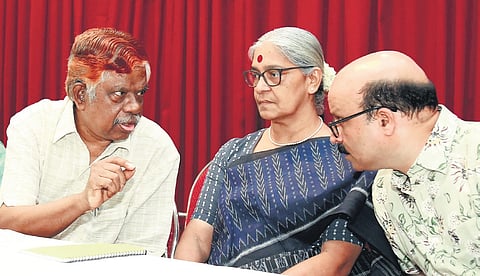

KOCHI: While strongly advocating for changes in anti-women provisions in the Muslim personal law, former Madras High Court judge Justice K Chandru on Saturday called for measures aimed at ensuring gender justice.
He was inaugurating the Equality Conference held in Kochi under the aegis of the Forum for Gender Equality Among Muslims (FORGEM), a group of Muslim activists who want timely reforms in Muslim personal law.
“When the United States adopted the Declaration of Independence in 1776, it stated that ‘all men are created equal’. There is no mention of women. However, after 200 years, the same statement holds the meaning -- ‘all are equal’ -- and if we look at America today, the law treats both genders equally. We should apply that lesson from America in our country,” he said while pitching for timely reforms in the Muslim personal law.
“We have different laws (personal laws) all over India. But what holds true for men should be true for women also, that is important. In that sense, polygamy is not the rule but monogamy is,” he added.
However, Justice Chandru, who served as the judge of Madras HC from 2009 to 2013, and disposed of 96,000 cases, is not in favour of the Uniform Civil Code (UCC) that the BJP government claims to be a milestone for women’s rights.
“The general perception about UCC is that you take the Hindu law, apply it to Muslims, then it becomes common. However, we won’t allow that. Because it’s for the people to decide what law they want,” he said.
The BJP government was testing the water when the UCC was rolled out in Uttarakhand. They couldn’t pass the Bill in the parliament as the BJP lost an outright majority after a shocking election. They then sent it to the Joint Parliamentary Committee, which sought the opinion from all over the country.
So far, the committee has received 1.2 crore petitions opposing the Bill, while only 62,000 people have supported the same. A majority of the population are against it,” he added.
CPM leaders conspicuous by their absence
While the organisers had said that P K Sreemathi, CPM central committee member and national president of All-India Democratic Women’s Association (AIDWA), would attend the inaugural session, and included her name in the notice, none of the CPM leaders turned up.
In 2022 too, the CPM representatives, including MLA Kanathil Jameela, stayed away from a similar meeting held in Kozhikode though they had initially agreed to take part.
It is widely believed that the CPM had decided to keep a distance from the conference not to antagonise a powerful section of conservative Muslims, who are against any change in the personal law.
However, CPI leader Annie Raja, who is also the general secretary of the National Federation of Indian Women, attended the programme.
“The laws, including the Muslim personal law, should reflect the change in times. Women should be treated on par with men. The Muslim women should have equal rights, including in the inheritance of property. When we raised the issue earlier, our party used to say that the demand should come from Muslim women themselves. I’m happy that a group of Muslim women have come forward though this (gender justice) is not an issue affecting them alone,” she said.
FORGEM passes resolution
FORGEM passed a resolution at the Equality Conference, batting for reforms in the Muslim personal law to reflect gender justice in all matters, including the succession of property.
“FORGEM is demanding reforms based on the rights guaranteed under the Constitution and also the basic principles of Islam, ie, justice and equality,” the note issued in this regard said. It also exhorted Muslim religious scholars to come forward & support the democratic rights of Muslim women